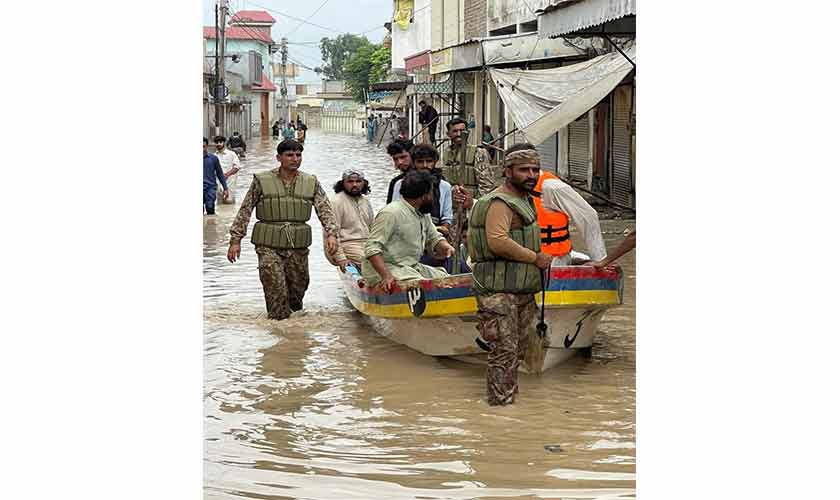Dr Hafiz Muhammad Usman Rana | Political Economy | August 31, 2025
The financial crisis is not beyond repair. However, there is a pressing need to act decisively

One year after signing a new agreement with the International Monetary Fund, Pakistan once again faces financial strain as well as a climate disaster. As the government prepares for the IMF’s next review, the economy is battered by floods, rising debt and the Fund’s growing frustration with the pace of governance reform. The question is not whether Islamabad can secure the next round of funding, but whether it can break its dependence on bailouts and reduce its vulnerability to climate shocks.
The 2025 floods, among the worst in years, have devastated large areas, some of them still recovering from the 2022 disaster. Entire communities have been submerged, crops wiped out and infrastructure swept away. Relief and rebuilding are consuming already meagre development allocations, leaving little room for long-term investment. The crisis worsened this week after, following heavy rains, India opened the gates of major dams in Occupied Kashmir.
Climate shocks now cost the government almost as much as its social spending. Pakistani officials have repeatedly urged the international community to provide affordable climate finance, arguing that the country contributes little to global emissions yet suffers disproportionately from their effects. Islamabad has struggled to meet the green finance conditions. Every flood increases the fiscal burden, forcing more borrowing and pushing the country deeper into debt.
That debt burden is already severe. Around the world, rising borrowing costs have pushed interest payments in advanced economies to 3.3 percent of GDP, more than their defence spending. For Pakistan, the picture is bleaker. Public debt stands at 74 percent of the GDP so that debt servicing consumes most of the federal revenue.
To meet IMF’s reserve target in June, Islamabad had to roll over $3.4 billion in Chinese loans, split between central bank deposits and refinanced credit. Rather than a triumph, this underscored Pakistan’s reliance on Beijing, without which the government risked a default on payment.
IMF’s concerns go beyond debt repayment. It has long criticised the misuse of development funds at parliamentarians’ discretion. The Fund now insists that such allocations be routed through the Public Sector Development Programme under stricter scrutiny.
Unchecked growth of digital finance has raised other red flags. Finance Minister Muhammad Aurangzeb has warned that about 15 percent of transactions bypass the formal system, increasing money-laundering risks and exposing Pakistan to another negative review by the Financial Action Task Force.
Conditionality remains central to IMF engagement. The Extended Fund Facility approved last year requires Pakistan to run a primary surplus, keep inflation in check and improve governance. So far, the progress has been uneven. Revenue targets have been missed and provincial surpluses have not materialied, yet the primary surplus requirement has been met. That may be enough to unlock another round of funding, but it does little to inspire confidence. A diagnostic mission earlier this year highlighted weaknesses in tax collection, central banking and enforcement of anti-money-laundering rules. The problems persist.
The upcoming IMF review will not be a final verdict; it will be a checkpoint. Success will buy the government time; failure could deepen the problems. For a government already stretched thin, the margin for error is perilously small.
Even if compliance is achieved, the external environment offers little comfort. Global growth is slowing, trade remains weak and tariff disputes are dampening demand. For Pakistan, which depends heavily on textile exports and remittances, this could mean smaller inflows. Energy tariff hikes, an IMF condition, may help the budget but hurts households and factories. Inflation may reassure creditors, but it risks public anger at home.
The crisis is not beyond repair. However, Pakistan needs to act decisively. The first requirement is prudent fiscal management that balances discipline with protection. Expanding the tax base, especially in agriculture and retail, can generate steady revenue. At the same time, austerity cannot be allowed to shred the social contract. Targeted subsidies delivered through digital wallets can cushion the poorest from rising prices.
The second is restructuring and resilience. Renegotiating repayment terms with bilateral creditors could ease immediate pressure and developing domestic debt markets can reduce reliance on foreign borrowing. More ambitiously, climate finance should be pursued not as charity, but as recognition of global responsibility. Wealthy nations provided more than $115.9 billion to developing countries in 2022. As one of the world’s most climate-vulnerable countries, Pakistan must secure its fair share.
The third priority is governance. Oversight of MPs’ schemes, stricter regulation of digital finance and timely release of a budget strategy are not symbolic gestures. If both federal and provincial governments demonstrate discipline, they can not only unlock IMF financing but also gain investor confidence.
Pakistan’s predicament is difficult but not insurmountable. The IMF will continue to demand reforms; the challenge is aligning those with national priorities. A strategy that combines fiscal prudence with climate resilience could move the country away from endless bailouts and toward sustainable recovery.
The irony remains stark. A country battered by climate change, largely caused by others, now finds itself penalised by markets for trying to rebuild. Each disaster raises fiscal costs; each bailout raises debt. The IMF can provide stability, but it cannot break the cycle. For that, Pakistan needs political consensus on tax fairness, institutional reform and the creativity to turn its climate vulnerability into leverage for green finance.
The upcoming IMF review will not be a final verdict but a checkpoint. Success will buy the government time; failure could deepen its problems. For a government already stretched thin, the margin for error is perilously small.
The writer is a senior lecturer in finance, leading partnerships and apprenticeships at Birmingham City University’s Department of Accountancy, Finance and Economics.

